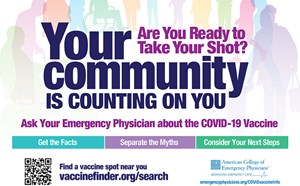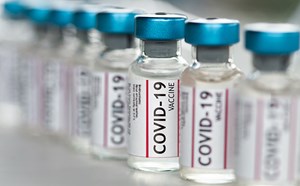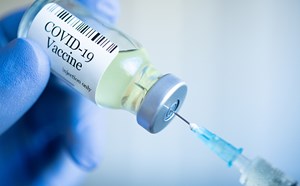The FDA and CDC has recommended that use of the Johnson & Johnson COVID-19 vaccine be paused after reports of blood clots in patients receiving the vaccine.
They also issued an important warning about the use of heparin to treat these patients (see bold text in summary below).
The CDC’s Advisory Committee on Immunization Practices (ACIP) met on April 14 and did not make any recommendations for Johnson & Johnson's coronavirus vaccine at this time. ACIP members commented they did not have enough information to make changes in their recommendations, or even to suggest extending a pause in administering the vaccine and need additional information. They will be hosting a follow-up virtual emergency meeting to discuss Johnson & Johnson (Janssen) COVID-19 vaccine 11 a.m. to 5 p.m. ET on April 23, 2021.
ACEP listened to the joint media call and put together a quick summary, including an important note about caring for these cases:
- So far more than 6.8 million doses of the Johnson & Johnson (Janssen) vaccine have been administered in the U.S.
- CDC and FDA are reviewing data involving six reported U.S. cases of a rare and severe type of blood clot in individuals after receiving the J&J vaccine.
- In these cases, a type of blood clot called cerebral venous sinus thrombosis (CVST) was seen in combination with low levels of blood platelets (thrombocytopenia).
- All six cases occurred among women between the ages of 18 and 48
- Symptoms occurred 6 to 13 days after vaccination
- Other thrombotic events have also occurred in these patients, including splanchnic vein thrombosis
- It is critical to note that treatment of this specific type of blood clot is different from the treatment that might typically be administered.
- Usually, anticoagulant drug heparin is used to treat blood clots.
- In this setting, administration of heparin may be dangerous, and alternative treatments need to be given.
Additional Clinical Guidance:
- Maintain a high index of suspicion for symptoms that might represent serious thrombotic events or thrombocytopenia in patients who have recently received the J&J COVID-19 vaccine, including:
- Severe headache
- backache
- new neurologic symptom
- severe abdominal pain
- shortness of breath
- leg swelling
- petechiae (tiny red spots on the skin) or
- new or easy bruising
- Obtain platelet counts and screen for evidence of immune thrombotic thrombocytopenia.
- In patients with a thrombotic event and thrombocytopenia after the J&J COVID-19 vaccine, evaluate initially with a screening PF4 enzyme-linked immunosorbent (ELISA) assay as would be performed for autoimmune heparin-induced thrombocytopenia.
- Consultation with a hematologist is strongly recommended.
- Do not treat patients with thrombotic events and thrombocytopenia following receipt of J&JCOVID-19 vaccine with heparin, unless HIT testing is negative.
- If HIT testing is positive or unable to be performed in patient with thrombotic events and thrombocytopenia following receipt of J&J COVID-19 vaccine, non-heparin anticoagulants and high-dose intravenous immune globulin should be strongly considered.
- Consultation with a hematologist is strongly recommended.
- Report adverse events to VAERS, including serious and life-threatening adverse events and deaths in patients following receipt of COVID-19 vaccines as required under the Emergency Use Authorizations for COVID-19 vaccines.
For additional clinical guidance, the American Society of Hematology has released Immune Thrombotic Thrombocytopenia: Frequently Asked Questions. This FAQ is designed to provide an overview of considerations around the diagnosis and treatment of VITT and will be updated as more information becomes available. Includes questions such as:
- "What clinical presentation should trigger consideration of VITT?"
- "What is an appropriate initial work-up?"
- "How should VITT be treated?"
Johnson & Johnson and AstraZeneca vaccines are both Adenovirus viral vector vaccines and it is important to also note that patients being reviewed appear similar to patients who had thrombotic events after AstraZeneca vaccine, which was determined to be immune-mediated thrombotic thrombocytopenia (ref: Greinacher A, Thiele T, Warkentin TE, et al. Thrombotic thrombocytopenia after ChAdOx1 nCov-19 vaccination. N Engl J Med 2021. doi:10.1056/NEJMoa2104840. pmid:33835769).
- Joint Media Call: FDA & CDC to Discuss Janssen COVID-19 Vaccine - 4/13/2021
- CDC Health Advisory Network release: Cases of Cerebral Venous Sinus Thrombosis with Thrombocytopenia after Receipt of the Johnson & Johnson COVID-19 Vaccine





